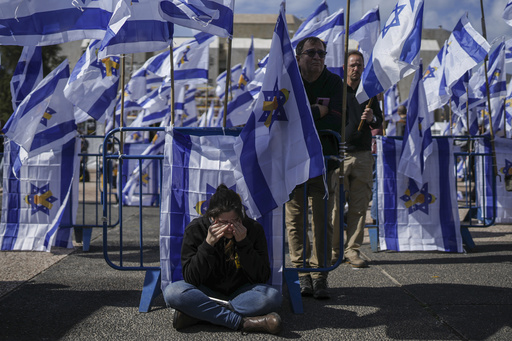
JERUSALEM — The Bibas family held onto hope until the very end, believing that their loved ones taken captive in Gaza — Shiri, a young mother, along with her two young sons — would make it back to Israel alive. Despite Hamas announcing the deaths of all three in a November airstrike and the Israeli military expressing “serious concern” regarding their fate, the family remained steadfast. The Bibas family even urged the public to hold off on commemorating their loved ones until an official autopsy conducted by the government could provide clarity.
However, the grim reality became apparent on Friday: the confirmed deaths of the boys, identified via DNA at a forensic institute in Israel, while Shiri’s remains were still unaccounted for. Prime Minister Benjamin Netanyahu revealed that the coffin intended for Shiri actually contained the body of a Palestinian woman from Gaza, adding to the family’s anguish. With Israel experiencing increased tension over the hostage crisis, this announcement was painfully chilling. It reignited worries for the Bibas family and the families of around 60 other hostages, who are left uncertain about the fate of their loved ones, whether they are alive or deceased. Netanyahu’s promise to retaliate on behalf of the Bibas family only amplified their distress.
“We sought certainty, but all this brings us is deep sorrow,” expressed Ofri Bibas Levy, the aunt of Ariel and Kfir. “In memory of Ariel and Kfir, and their father Yarden, we aren’t pursuing revenge at this time. We just want to find Shiri.”
Shiri Bibas became an image of fear during the Hamas assault on Israel on October 7, 2023. A heart-wrenching video captured her terror as she clutched her sons, Ariel, who was four, and nine-month-old Kfir, as they were taken away by armed militants into Gaza. The tragic attack left approximately 1,200 Israelis dead and saw 251 individuals taken hostage, igniting a devastating conflict in Gaza.
Recently, Hamas showcased coffins labeled with Shiri and her sons’ names, with a backdrop displaying their images along with a mocking cartoon of Netanyahu. While Hamas claims that the boys died due to Israeli strikes, Israel contends that they were killed at the hands of their captors, leaving both sides yet to provide substantial evidence to confirm their claims. In light of the situation surrounding Shiri’s body, Hamas indicated that it is investigating the situation and suggested that the chaos following Israeli airstrikes may have led to mixed-up remains.
“We have no intention of holding onto any bodies,” stated Hamas in a public announcement. “We have adhered to every term of the agreement and remain committed.”
The ceasefire, which started on January 19, calls for Hamas to release 33 hostages in exchange for nearly 2,000 Palestinians detained by Israel. Six more hostages are slated to be freed on Saturday, following the recent release of five Thai nationals held since the conflict began.
The Bibas family, now grieving for Ariel and Kfir, is left again in a state of anticipation, waiting for definitive news regarding Shiri’s whereabouts. Yarden Bibas, the boys’ father, who was taken hostage by Hamas and released on February 1, shared on social media, “My light is still there, and until my family is back, everything remains dark.”
For many, the plight of the Bibas family has come to symbolize the broader struggle for justice and the demand for the release of hostages during this war. On Thursday, thousands of Israelis gathered along the route from southern Israel to the National Forensic Institute in Tel Aviv, demonstrating solidarity by standing in the rain with flags as the convoy passed by them. Their silent vigil featured tears and quietly sung renditions of Israel’s national anthem. This somber gathering also marked the release of Oded Lifshitz, aged 83, who had been abducted.
Public concern for the Bibas family intensified during a temporary ceasefire in November 2023 when approximately 100 hostages, primarily women and children, were released. The interest peaked again in recent weeks as additional living female hostages came home. Kfir, the youngest hostage at just nine months during the horrific events of October 7, became a prominent symbol of innocence amid turmoil, with his story reaching international leaders and gaining focus worldwide.
The Bibas family has actively taken part in protests, embracing orange as their symbolic color representing their fight for the “ginger babies.” They celebrated Kfir’s first birthday by releasing orange balloons, while actively lobbying politicians for aid and assistance. Shared family photos flooded television screens and social media, allowing the entire nation to connect with the boys and cherish the memories of joyful days spent together, including a family costume celebration featuring Batman, which Ariel adored.
The Hostages Families Forum has emphasized that there are still hostages in Gaza whose lives hang in the balance, advocating for an extension of the ceasefire to save as many as possible. “Time is of the essence,” they declared in a public statement.
Throughout the conflict, the uncertainty surrounding Shiri Bibas and her children has left relatives and the community grappling with confusion. Shiri’s sister, Dana Silberman-Sitton, expressed that she had resigned to the belief that neither Shiri nor the boys were alive after Hamas claimed their deaths from Israeli airstrikes. “To cope with this uncertainty, I had to convince myself that they were gone,” she disclosed in an interview.
In jarring contrast, Yarden’s sister, Ofri Bibas Levy, clung to hope, traveling internationally for various missions and giving numerous interviews to keep the family’s plight present in public discourse. The story of the Bibas family has resonated deeply with both Israeli citizens and global audiences because it encapsulates the heartbreaking consequences of the October 7 assault, noted Ruth Pat-Horenczyk, a professor specializing in trauma at the Hebrew University. She observed, “The vivid imagery of a mother striving to shield her two babies has left a lasting impression on the nation, serving as an emblematic illustration of the pain felt throughout this traumatic event.”

